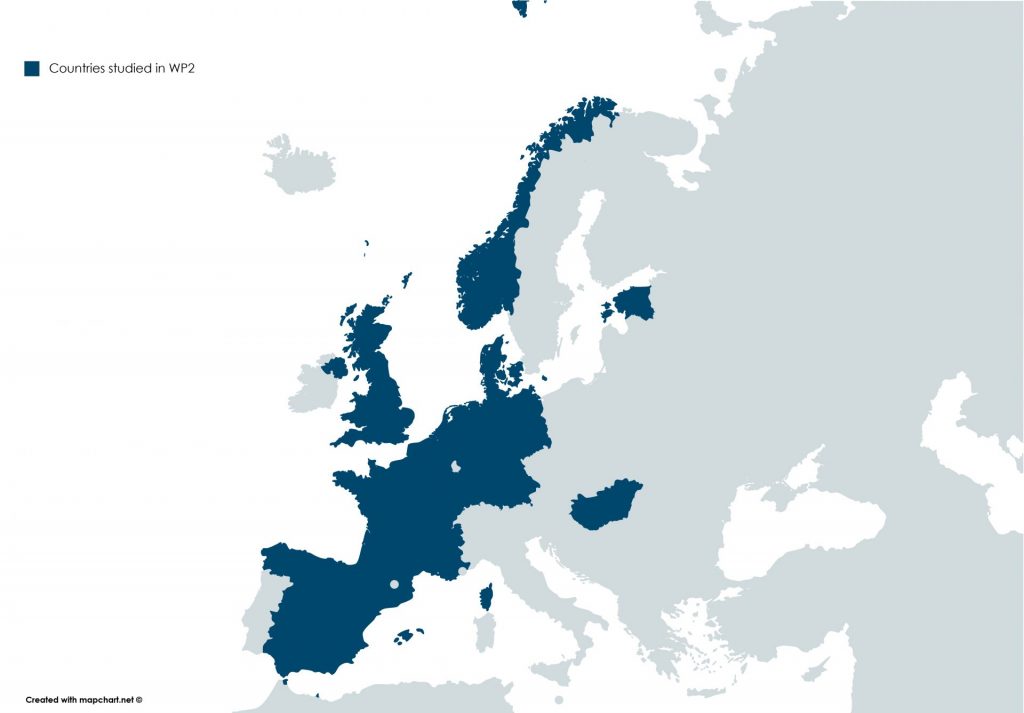Transformation of Institutional Conditions of Collaboration (Work Package 2 – WP2)
Led by Central European University (Budapest, Hungary), this work package conducted research from the start of the TROPICO project in June 2017 to May 2020.
The WP2 team laid the foundation for further TROPICO research by exploring the institutional conditions shaping collaboration in and by governments, with a focus on formal rules regulating collaborative behaviour. Three main research questions were investigated:
- What are the most important institutional conditions that facilitate or hinder collaboration?
- What do these conditions look like in the ten EU countries selected for study?
- How do institutional, and particularly legal frameworks, differ across countries?
To answer these questions, the team compared ten European countries, focusing on:
- Institutional conditions, particularly formal rules embedding administrative traditions, reform trajectories and governmental and state structures
- Codified rules on collaboration in laws and administrative guidelines (‘codes of collaboration’)
- The impact of rules in terms of facilitating or obstructing the emergence of collaboration in and by governments
Research
The WP2 team initiated its work with a review of the academic literature on collaborative governance as well as reports produced by governments, independent research centres and think tanks (grey literature), in order to map what is known about the role of institutional conditions for collaboration. From this literature, a list of institutional factors that are seen to facilitate or obstruct collaboration was derived. The results are especially relevant to the wider academic research community and provide important background information for further studies of collaboration and collaborative practices. See D2.1 Literature and report review.
Following the literature review, the WP2 researchers mapped and studied codes of collaboration in the ten selected European countries. These included constitutions, laws, statutory instruments and formal regulations or other rules and guidelines at national level on collaboration, data protection, data sharing and freedom of information. The related report provides short summaries of the codes of collaboration, and thereby offers crucial data suitable for further research and exploration: it serves to provide scholars and policymakers with easily accessible knowledge about the rules and regulations pertaining to collaboration. See D2.2 Codes of collaboration report.
The Codes of Collaboration collection is available online (in the original language with summaries in English). Based on input from partners and available secondary data, a comparative meta-analysis of regulatory frameworks was conducted across the ten case study countries. It identified similarities and differences in the institutional framework for collaboration. The report informs that two key sources of transformation towards (more) collaborative governance can be found in technological development and ideational shifts to open government. Exploring such different paths in different countries, and the reasons for them, will be relevant for further research. See D2.3 Research report.

Results and findings
TROPICO’s Work Package 2 drew a wide range of conclusions regarding how institutions and academics understand, define and manage the phenomenon of collaboration.
The work done through TROPICO’s Work Package 2 largely contributes to the understanding ‘collaboration’ at a European level with providing both theoretical and empirical insight on how academics and governments define the concept and manage its delivery.
Based on a quantitative text analysis of over 700 publications, D2.1 Literature and report review provides a systematic review of how the concept is interpreted in the academic literature, as well as a qualitative review drawing on a wide range of sources. The WP2 team found that the term ‘collaborative governance’ is used to describe practices that differ in terms of five key dimensions:
- participation (inside and/or outside government);
- agency (who drives these processes);
- inclusiveness (organizational and/or citizen participation);
- scope (time frame and stage of policy cycle);
- and normative assumptions (positive or neutral).
One of the main results of Work Package 2 is a comparative study of codified documents of governmental collaboration practices from 10 European countries. The research leading to D2.2 Codes of collaboration report is based on the input documents received from TROPICO partner countries from a spectrum wide as constitutions, laws, statutory instruments, administrative guidelines, relevant policy papers, and administrative orders or guidelines. Some codes are relatively general, stating the principle of collaboration without going into specific requirements, while the bulk of practical information and specific requirements for collaboration are often contained in guidelines, and are often not applicable to the whole of the government sector. This can result in a situation where, even within a specific country, the requirements for collaboration – or indeed the degree to which collaboration is codified – may vary significantly from sector to sector. This comparative research highlighted differences between the 10 partner countries related to the connotation and organisation of collaborative practices.
As countries are governed in their own official languages, the comparative research done in Work Package 2 had a strong connotative angle. As described in the article The fuzzy concept of collaborative governance: A systematic review of the state of the art and the working paper The connotations of Collaboration: European Linguistic and Scholarly Perspectives on Collaborative Governance collaborative governance has slightly different perception and meaning across Europe. Linguistic and cultural background therefore has an influence on how the governments form, the population perceive and scholars understand collaboration. On this note, the article The use and abuse of participatory governance by populist governments presents an example how a participatory practice, something that scholars generally see as an initiative to improve the quality of democracy, could be a tool for manipulation in the political arena instead.
Scientific publications
Batory A., and Svensson, S. (2020), The use and abuse of participatory governance by populist governments, Policy & Politics, 47(2): 227-44
The article discusses how populists manipulate and appropriate methods and discourse of participatory governance in order to present themselves as the only representatives of the voice of the people facing a corrupt elite, along with explaining the implications for scholarship resulting from popular input in policy making.
Batory A., and Svensson, S. (2019), Regulating Collaboration: The Legal Framework of Collaborative Governance in Ten European Countries, International Journal of Public Administration
The article analyses the role of legal requirements for collaboration between governments and societal actors in the context of ten European countries.
Batory A., and Svensson, S. (2019), The fuzzy concept of collaborative governance: A systematic review of the state of the art, Central European Journal of Public Policy, 13(2): 28-39
The article presents the current state of the art related to collaborative governance, discuss preliminary findings on 'grey' literature on this topic in Europe, and reflect on the connotations of the collaborative governance term in different European languages.
Svensson, S. (2019), The connotations of Collaboration: European Linguistic and Scholarly Perspectives on Collaborative Governance, CEU CPS Working Paper Series, 2019/1
The working paper by Sara Svensson on "The connotations of collaboration: European linguistic and scholarly perspectives on collaborative governance" questions the assumption of common understanding of collaboration in European policy rhetoric and highlights the importance of government discourse. The paper also shows that the "collaborative governance" term can have different meanings in different country contexts.
The team
Led by Central European University (Hungary), the WP2 team gathered a large team composed of ten partner institutions: Cardiff University (the UK), Erasmus University Rotterdam (The Netherlands), French National Centre for Scientific Research (CNRS)/Grenoble Institute of Political Studies (France), Hertie School (Berlin, Germany), Roskilde University (Denmark), Tallinn University of Technology (Estonia), University of Antwerp (Belgium), University of Bergen (Norway), and University of Zaragoza (Spain).
























